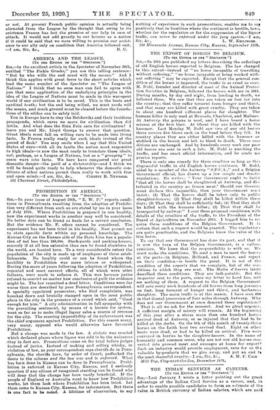PROHIBITION IN AMERICA
(To THE EDITOR OF THE "SPECTATOR.")
Sm,—In your issue of August 28th, "E. W. P." reports condi- tions in Pennsylvania resulting from the adoption of Prohibi- tion very different from such as are gated by me in your issue of July 17th. Where Prohibition is proposed in one locality, how the experiment works in another may well be considered. No better data can be found as basis for a correct conclusion. But the evidence Mr. P. offers cannot be considered. The experiment has not been tried in his locality. Now permit me to state specific facts within my personal knowledge. The Kansas City on the Kansas side of the State Line has a popula- tion of not less than 100,00o. Stock-yards and packing-houses, scarcely if at all less extensive than can be found elsewhere in the world, are located here. To a very considerable extent the population of the city is made up of employees of these estab- lishments. No locality could or can be found where the hostility to Prohibition was more intense or widespread. During the score of years following the adoption of Prohibition, repeated and most earnest efforts, all of which were utter failures, were made to enforce it. This was because juries refused to convict no matter how conclusive of guilt the evidence might be. The law remained a dead letter. Conditions were far worse than are described by your Pennsylvania correspondent. A specially appointed prosecutor, who filed complaints, was knocked down and brutally stamped upon in the most public place in the city in the presence of a crowd which said, "Good enough for him." A city administration in full sympathy with the prevailing sentiment, by means of a licence fee system, went so far as to make illegal liquor sales a source of revenue for the city. The seeming impossibility of its enforcement was the chief argument against Prohibition. For this reason many, very many, opposed who would otherwise have favoured Prohibition.
But a change was made in the law. A statute was enacted which declared places where liquor was sold to bo the nuisances -they in fact are. Prosecutions came on for trial before judges instead of juries. Instead of making and selling whisky, in violation of law, as your correspondent says sheriffs do in Penn- sylvania, the sheriffs here, by order of Court, padlocked the doors to the saloons and the law was and is enforced. What has been done in Kansas can be done in Pennsylvania. Prohi- bition is enforced in Kansas City, Kansas, and I seriously question if any citizen of recognized standing can be found who will deny that the change has been vastly beneficial. If the people of England or Australia want to know how Prohibition works, let them look where Prohibition has been tried. Lot them come to Kansas City, Kansas, for information. But there is one fact to be noted. A lifetime of observation, to say
nothing of experience in such prosecutions, enables me to say positively that in localities where the sentiment is hostile, laws. whether for the regulation or for the suppression of the liquor traffic, can never be enforced under the jury system—I am, Sir, &c., L. W. Kmixisose. 710 Minnesota Avenue, Kansas City, Kansas, September 18th.


































 Previous page
Previous page